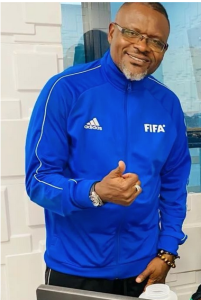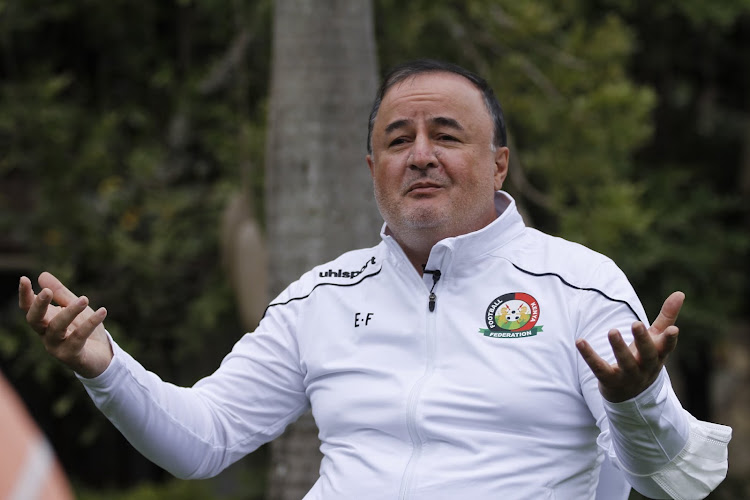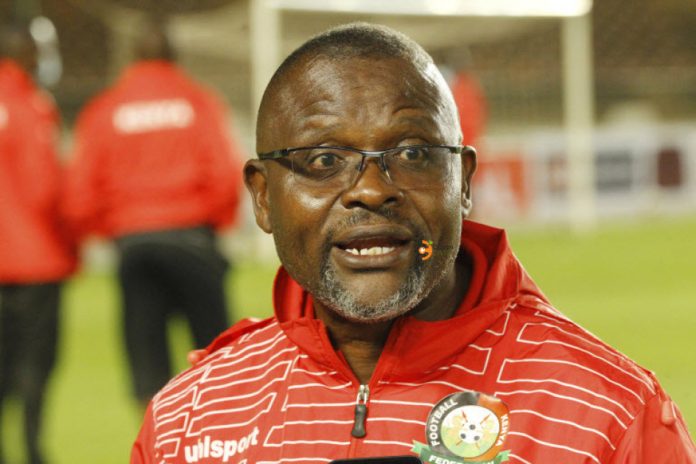Mulee, known for his pivotal role in Kenyan football, has advised Firat to embrace criticism, highlighting that managing the national team comes with intense scrutiny.
Engin Firat, the current head coach of Kenya’s national football team, Harambee Stars, has found himself at the center of a public debate after comments made by former coach Jacob ‘Ghost’ Mulee.
It is not unusual for football managers, particularly in high-stakes roles like Firat’s, to face public and professional criticism.
Mulee emphasized that as a former coach and a devoted football fan, he is within his rights to voice his opinions on the state of Harambee Stars, just as any other Kenyan would.
The exchange between the two coaches has captured public attention and ignited discussions within the Kenyan football community.
ALSO READ:Firat Blasts Kenyan Fans for Lack of Support Despite Dominant Win Over Namibia
- Ghost Mulee Criticizes Coach Engin Firat’s Tactics After Harambee Stars’ Goalless Draw Against Zimbabwe in AFCON Qualifier
- Ghost Mulee’s Game Plan for Harambee Stars’ 2025 AFCON Qualification
- Harambee Stars Coach Engin Firat Faces Ksh. 13.5 Million Unpaid Salary: Kenya’s Football Crisis
Mulee’s Right to Critique as a Former Coach and Football Fan
In football, criticism is often seen as a double-edged sword. It can provide valuable insights or stir up controversy.
Jacob Mulee, one of Kenya’s most respected football minds, did not shy away from offering his thoughts on the tactical decisions made by Firat in recent matches.
Firat’s decision to not start a striker in Harambee Stars’ goalless Afcon 2025 qualifier against Zimbabwe raised eyebrows, including Mulee’s.
“Firat needs to understand that in this role, criticism comes with the territory. If you win, we celebrate. If you lose or make questionable decisions, we will comment,” Mulee stated confidently.

Mulee’s experience with the national team, having led them to the 2004 Africa Cup of Nations (Afcon), provides him with a unique perspective.
He emphasized that his comments were made out of concern for the team’s performance and as a passionate fan of Kenyan football. “Without a striker, I didn’t see how we would score,” Mulee added, reflecting on Firat’s tactical decision.
Firat, however, took offense to these remarks, accusing Mulee of criticizing his tactics and stirring unnecessary controversy during a crucial time for the team.
Firat, during a post-match press conference after Harambee Stars’ 2-1 win against Namibia, hinted that some criticisms were part of ongoing political maneuvering as the Football Kenya Federation (FKF) prepares for upcoming elections.
Mulee dismissed these claims, reiterating that his comments were purely based on footballing matters.
Criticism in Football: An Inevitable Part of the Job
Being in charge of a national football team is no easy task. It involves balancing expectations from fans, players, and the football federation.
Criticism, whether constructive or not, is inevitable, especially when the team underperforms or decisions are deemed controversial.
Mulee pointed out that Firat’s role comes with the inherent responsibility of handling criticism gracefully. “Firat is in the hot seat. If he wins, we will all celebrate. But if he doesn’t, we will speak our minds because Kenya is a democratic country,” Mulee said.
The coach-player dynamic in football is often under scrutiny, and tactical decisions are analyzed by the media and the public.
When Firat decided not to start a striker in a crucial Afcon qualifier, it left many questioning whether Kenya had any realistic chance of scoring. For Mulee, the omission of a recognized striker was a decision that needed to be questioned.
Firat’s Tactical Decisions Under the Microscope
His critique of Firat’s tactics during the match against Zimbabwe wasn’t merely a blanket criticism; it was a focused observation on how Kenya could have set up better to win the game.
Firat’s decision to leave out a striker raised concerns about the team’s ability to create goal-scoring opportunities. Mulee noted that while the defense and midfield held up well, without an attacking outlet, the chances of converting possession into goals were slim.
“We respect Firat’s tactics, but we cannot ignore the fact that we didn’t have a striker. In my view, it’s difficult to score without one. I’m not saying this to undermine Firat’s work, but it’s something worth discussing,” He clarified.
Criticism isn’t always about undermining someone’s role, and Mulee highlighted that Firat should take these discussions in stride.
He expressed that football is a results-driven sport, and people will always talk, especially when the team doesn’t deliver expected results.

Firat’s Response and Mulee’s Lighter Take
Engin Firat, in response to Mulee’s comments, defended his decision-making process and hit back at his predecessor for stirring controversy.
During the post-match conference following Kenya’s win over Namibia, Firat made it clear that he was focused on the team’s future and dismissed any notion of being pressured by external opinions.
Firat acknowledged the criticisms but insisted that his primary concern was fielding the best team for the day.

On a lighter note, Jacob joked that his critique might have had an influence on Firat’s decision to play strikers John Avire and Jonah Ayungo in the match against Namibia, with Avire scoring the opener.
Mulee pointed out that constructive criticism sometimes leads to better decisions, and he was pleased to see a more attacking setup in the next match.
“Maybe he listened to me after all. Avire scored after being fielded in the next game,” Mulee quipped.
Despite their disagreements, Mulee extended his sympathy to Firat, acknowledging the financial struggles the coach has been facing, particularly the fact that Firat had not been paid for the past nine months.
Unresolved Financial Challenges in Kenyan Football
His sympathy toward Firat’s financial woes highlights a persistent issue within Kenyan football—the lack of timely payment for coaches and staff.
Firat’s admission that he has not been paid for nine months echoes Mulee’s own experience when he was in charge of Harambee Stars. Mulee recalled that during his time as head coach in 2004, he went without payment for eight months.
“When I led Stars to the 2004 Afcon, I hadn’t been paid for eight months. Twenty years later, we are still facing the same problems. Where are we headed? To motivate coaches, we must pay them on time,” Mulee said.
This financial instability has been a long-standing issue in Kenyan football, affecting not only the coaching staff but also the players.
Mulee emphasized that if Kenya is to make strides in international football, the basic infrastructure, including financial support, must be in place.
The former coach, however, clarified that he has no intention of lodging a complaint with FIFA over unpaid salaries.
Looking Ahead: Firat’s Future and the Role of Criticism
Despite the tension between the two coaches, it’s clear that both Firat and Mulee want the best for Kenyan football. While their approaches may differ, they are united in their desire to see Harambee Stars succeed on the international stage.
Firat’s tenure as Harambee Stars coach will continue to be scrutinized, especially with upcoming Afcon qualifiers on the horizon.
Mulee’s advice to Firat about embracing criticism is rooted in his own experiences as a national coach. He understands the pressures of the job and believes that Firat has the potential to succeed, provided he learns to handle public and professional criticism in a positive way.
Football, after all, is a sport where results matter most. As long as Harambee Stars continue to strive for success, discussions and debates will always surround the team. Firat’s challenge will be to navigate these waters while staying focused on improving the team’s performance on the pitch.
Navigating Criticism in Football
As Jacob Mulee and Engin Firat continue to voice their opinions, the broader conversation about criticism in football takes center stage.
For Firat, the key to longevity in his role as Harambee Stars coach will be to embrace the feedback, both positive and negative, while focusing on delivering results.
For Mulee, his passion for Kenyan football continues to drive his commentary, and his experience as a former coach gives him valuable insight into the game.
Ultimately, Kenyan football fans will be watching closely as Harambee Stars take on future challenges, and both Firat and Mulee will play their part in shaping the narrative.
With a combination of tactical nous, support from fans, and perhaps even a little luck, Harambee Stars could continue to rise and make their mark on the international stage.




